Impact of CSR Policy on Workplace and Stakeholders: A Detailed Report
VerifiedAdded on 2022/08/24
|8
|1856
|28
Report
AI Summary
This report delves into the multifaceted impact of Corporate Social Responsibility (CSR) policies on the workplace and the broader corporate landscape. It assesses the ethical nature of an organization, identifying key stakeholders such as employees, customers, and the community, along with their respective roles and responsibilities. The analysis covers the potential impact of CSR on various stakeholders, examining both the benefits and costs associated with these policies. The report also investigates the relationship between CSR and profit maximization, exploring the arguments for and against its adoption. Additionally, it examines the ethical issues businesses face, including trust, integrity, and the importance of establishing codes of conduct. The report highlights the influence of ethical corporate culture on employee productivity, loyalty, and overall organizational performance. Finally, it outlines the potential consequences for organizations that fail to adhere to ethical standards, including financial impacts and reputational damage. The report draws on several academic sources to support its claims.
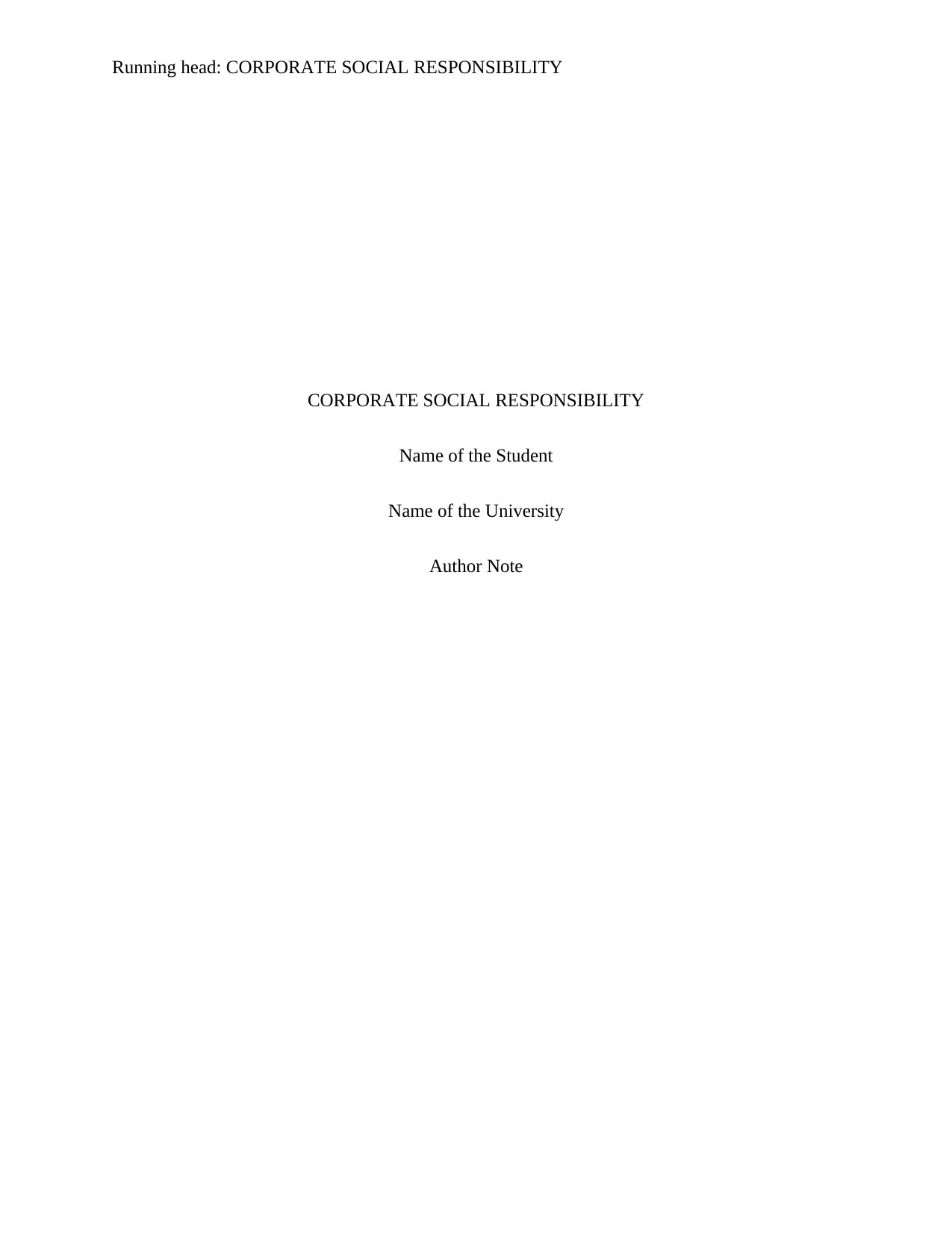
Running head: CORPORATE SOCIAL RESPONSIBILITY
CORPORATE SOCIAL RESPONSIBILITY
Name of the Student
Name of the University
Author Note
CORPORATE SOCIAL RESPONSIBILITY
Name of the Student
Name of the University
Author Note
Paraphrase This Document
Need a fresh take? Get an instant paraphrase of this document with our AI Paraphraser
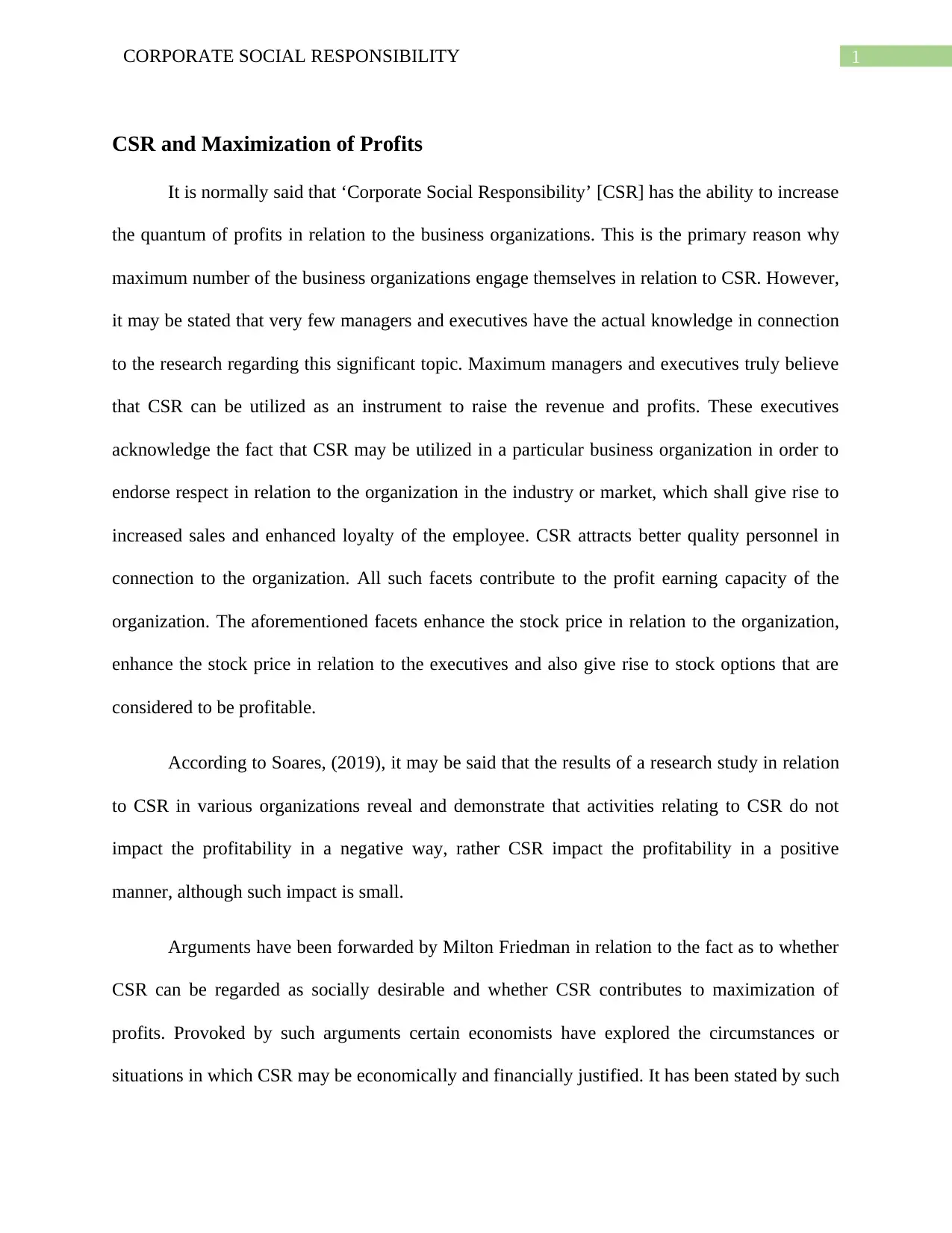
1CORPORATE SOCIAL RESPONSIBILITY
CSR and Maximization of Profits
It is normally said that ‘Corporate Social Responsibility’ [CSR] has the ability to increase
the quantum of profits in relation to the business organizations. This is the primary reason why
maximum number of the business organizations engage themselves in relation to CSR. However,
it may be stated that very few managers and executives have the actual knowledge in connection
to the research regarding this significant topic. Maximum managers and executives truly believe
that CSR can be utilized as an instrument to raise the revenue and profits. These executives
acknowledge the fact that CSR may be utilized in a particular business organization in order to
endorse respect in relation to the organization in the industry or market, which shall give rise to
increased sales and enhanced loyalty of the employee. CSR attracts better quality personnel in
connection to the organization. All such facets contribute to the profit earning capacity of the
organization. The aforementioned facets enhance the stock price in relation to the organization,
enhance the stock price in relation to the executives and also give rise to stock options that are
considered to be profitable.
According to Soares, (2019), it may be said that the results of a research study in relation
to CSR in various organizations reveal and demonstrate that activities relating to CSR do not
impact the profitability in a negative way, rather CSR impact the profitability in a positive
manner, although such impact is small.
Arguments have been forwarded by Milton Friedman in relation to the fact as to whether
CSR can be regarded as socially desirable and whether CSR contributes to maximization of
profits. Provoked by such arguments certain economists have explored the circumstances or
situations in which CSR may be economically and financially justified. It has been stated by such
CSR and Maximization of Profits
It is normally said that ‘Corporate Social Responsibility’ [CSR] has the ability to increase
the quantum of profits in relation to the business organizations. This is the primary reason why
maximum number of the business organizations engage themselves in relation to CSR. However,
it may be stated that very few managers and executives have the actual knowledge in connection
to the research regarding this significant topic. Maximum managers and executives truly believe
that CSR can be utilized as an instrument to raise the revenue and profits. These executives
acknowledge the fact that CSR may be utilized in a particular business organization in order to
endorse respect in relation to the organization in the industry or market, which shall give rise to
increased sales and enhanced loyalty of the employee. CSR attracts better quality personnel in
connection to the organization. All such facets contribute to the profit earning capacity of the
organization. The aforementioned facets enhance the stock price in relation to the organization,
enhance the stock price in relation to the executives and also give rise to stock options that are
considered to be profitable.
According to Soares, (2019), it may be said that the results of a research study in relation
to CSR in various organizations reveal and demonstrate that activities relating to CSR do not
impact the profitability in a negative way, rather CSR impact the profitability in a positive
manner, although such impact is small.
Arguments have been forwarded by Milton Friedman in relation to the fact as to whether
CSR can be regarded as socially desirable and whether CSR contributes to maximization of
profits. Provoked by such arguments certain economists have explored the circumstances or
situations in which CSR may be economically and financially justified. It has been stated by such
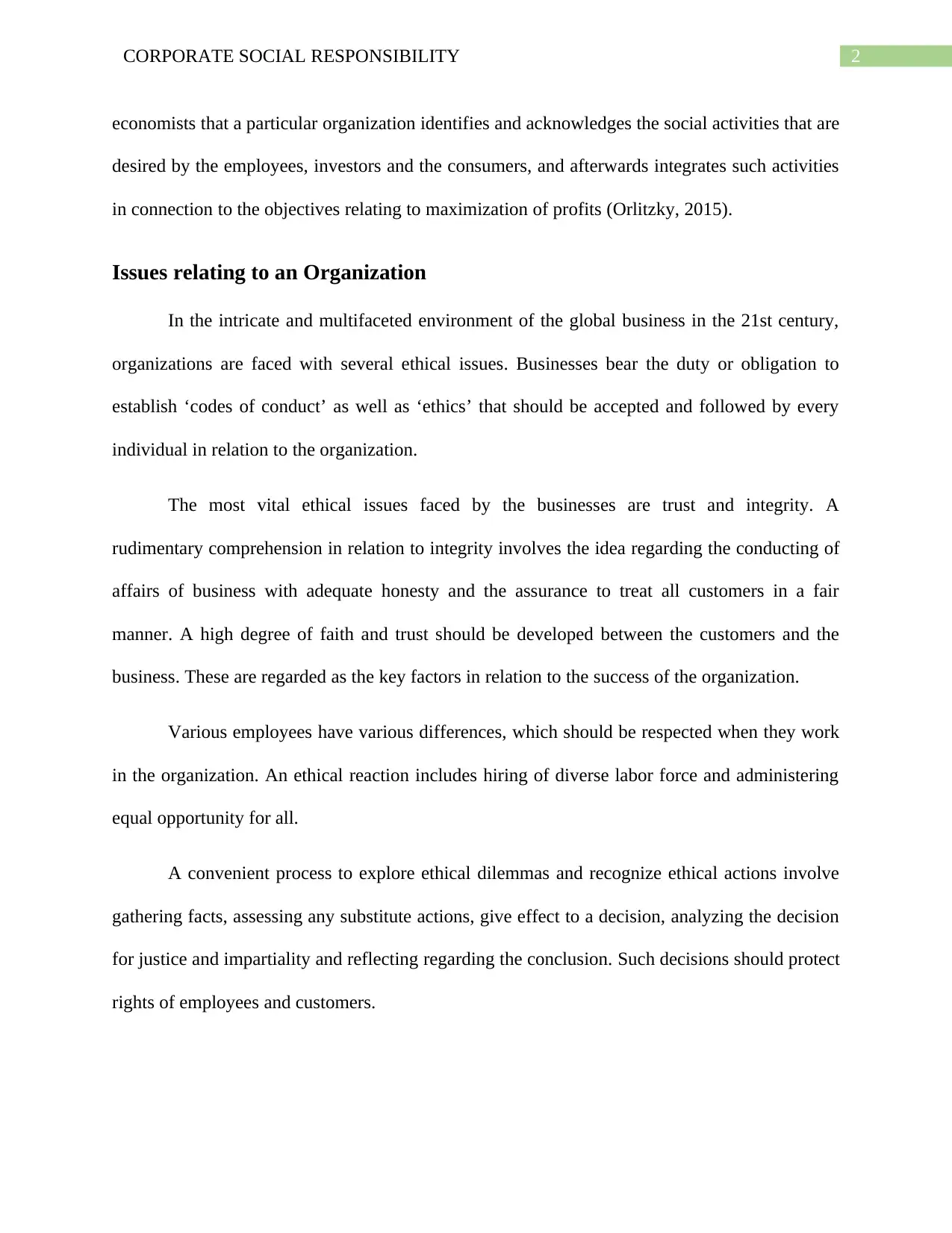
2CORPORATE SOCIAL RESPONSIBILITY
economists that a particular organization identifies and acknowledges the social activities that are
desired by the employees, investors and the consumers, and afterwards integrates such activities
in connection to the objectives relating to maximization of profits (Orlitzky, 2015).
Issues relating to an Organization
In the intricate and multifaceted environment of the global business in the 21st century,
organizations are faced with several ethical issues. Businesses bear the duty or obligation to
establish ‘codes of conduct’ as well as ‘ethics’ that should be accepted and followed by every
individual in relation to the organization.
The most vital ethical issues faced by the businesses are trust and integrity. A
rudimentary comprehension in relation to integrity involves the idea regarding the conducting of
affairs of business with adequate honesty and the assurance to treat all customers in a fair
manner. A high degree of faith and trust should be developed between the customers and the
business. These are regarded as the key factors in relation to the success of the organization.
Various employees have various differences, which should be respected when they work
in the organization. An ethical reaction includes hiring of diverse labor force and administering
equal opportunity for all.
A convenient process to explore ethical dilemmas and recognize ethical actions involve
gathering facts, assessing any substitute actions, give effect to a decision, analyzing the decision
for justice and impartiality and reflecting regarding the conclusion. Such decisions should protect
rights of employees and customers.
economists that a particular organization identifies and acknowledges the social activities that are
desired by the employees, investors and the consumers, and afterwards integrates such activities
in connection to the objectives relating to maximization of profits (Orlitzky, 2015).
Issues relating to an Organization
In the intricate and multifaceted environment of the global business in the 21st century,
organizations are faced with several ethical issues. Businesses bear the duty or obligation to
establish ‘codes of conduct’ as well as ‘ethics’ that should be accepted and followed by every
individual in relation to the organization.
The most vital ethical issues faced by the businesses are trust and integrity. A
rudimentary comprehension in relation to integrity involves the idea regarding the conducting of
affairs of business with adequate honesty and the assurance to treat all customers in a fair
manner. A high degree of faith and trust should be developed between the customers and the
business. These are regarded as the key factors in relation to the success of the organization.
Various employees have various differences, which should be respected when they work
in the organization. An ethical reaction includes hiring of diverse labor force and administering
equal opportunity for all.
A convenient process to explore ethical dilemmas and recognize ethical actions involve
gathering facts, assessing any substitute actions, give effect to a decision, analyzing the decision
for justice and impartiality and reflecting regarding the conclusion. Such decisions should protect
rights of employees and customers.
⊘ This is a preview!⊘
Do you want full access?
Subscribe today to unlock all pages.

Trusted by 1+ million students worldwide
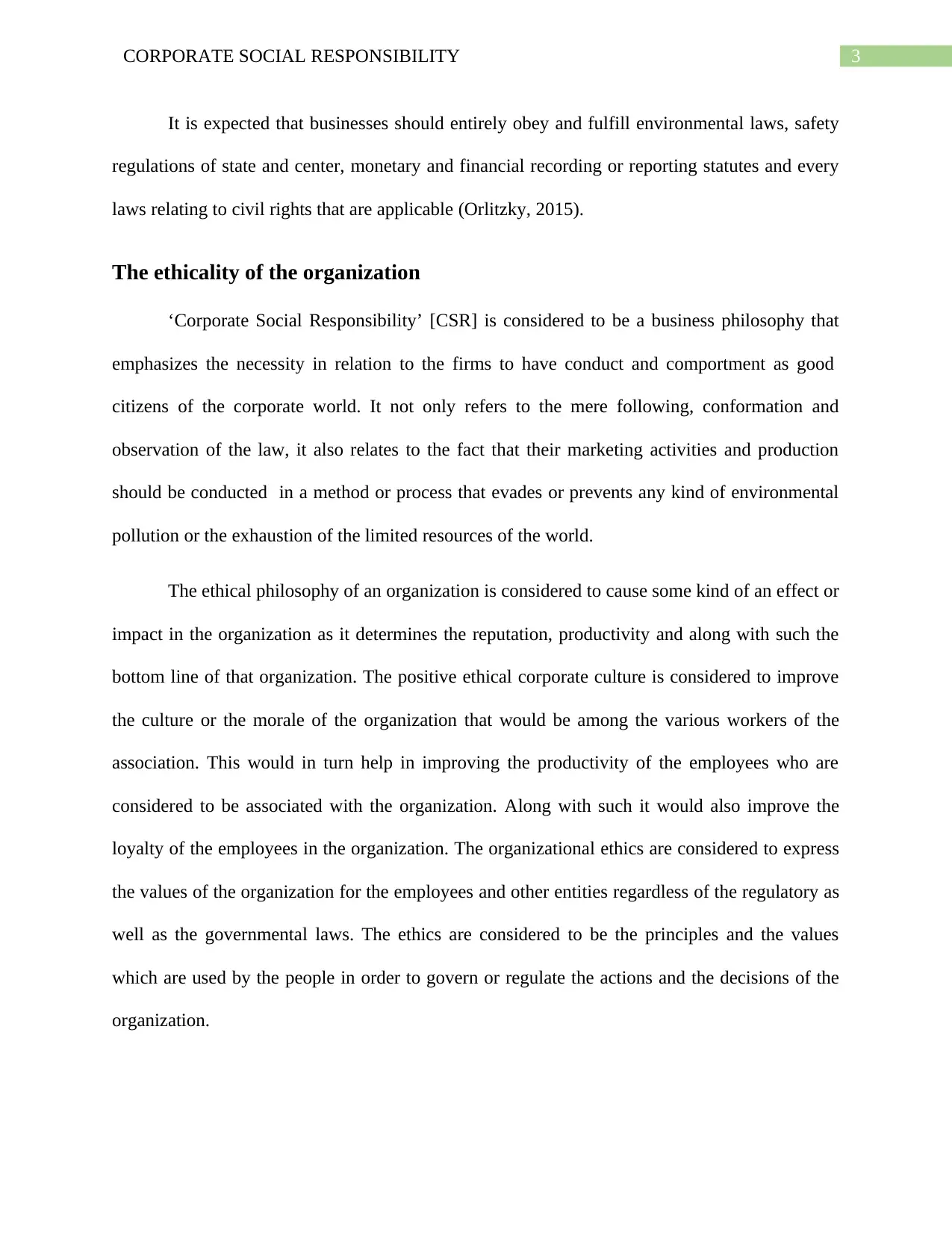
3CORPORATE SOCIAL RESPONSIBILITY
It is expected that businesses should entirely obey and fulfill environmental laws, safety
regulations of state and center, monetary and financial recording or reporting statutes and every
laws relating to civil rights that are applicable (Orlitzky, 2015).
The ethicality of the organization
‘Corporate Social Responsibility’ [CSR] is considered to be a business philosophy that
emphasizes the necessity in relation to the firms to have conduct and comportment as good
citizens of the corporate world. It not only refers to the mere following, conformation and
observation of the law, it also relates to the fact that their marketing activities and production
should be conducted in a method or process that evades or prevents any kind of environmental
pollution or the exhaustion of the limited resources of the world.
The ethical philosophy of an organization is considered to cause some kind of an effect or
impact in the organization as it determines the reputation, productivity and along with such the
bottom line of that organization. The positive ethical corporate culture is considered to improve
the culture or the morale of the organization that would be among the various workers of the
association. This would in turn help in improving the productivity of the employees who are
considered to be associated with the organization. Along with such it would also improve the
loyalty of the employees in the organization. The organizational ethics are considered to express
the values of the organization for the employees and other entities regardless of the regulatory as
well as the governmental laws. The ethics are considered to be the principles and the values
which are used by the people in order to govern or regulate the actions and the decisions of the
organization.
It is expected that businesses should entirely obey and fulfill environmental laws, safety
regulations of state and center, monetary and financial recording or reporting statutes and every
laws relating to civil rights that are applicable (Orlitzky, 2015).
The ethicality of the organization
‘Corporate Social Responsibility’ [CSR] is considered to be a business philosophy that
emphasizes the necessity in relation to the firms to have conduct and comportment as good
citizens of the corporate world. It not only refers to the mere following, conformation and
observation of the law, it also relates to the fact that their marketing activities and production
should be conducted in a method or process that evades or prevents any kind of environmental
pollution or the exhaustion of the limited resources of the world.
The ethical philosophy of an organization is considered to cause some kind of an effect or
impact in the organization as it determines the reputation, productivity and along with such the
bottom line of that organization. The positive ethical corporate culture is considered to improve
the culture or the morale of the organization that would be among the various workers of the
association. This would in turn help in improving the productivity of the employees who are
considered to be associated with the organization. Along with such it would also improve the
loyalty of the employees in the organization. The organizational ethics are considered to express
the values of the organization for the employees and other entities regardless of the regulatory as
well as the governmental laws. The ethics are considered to be the principles and the values
which are used by the people in order to govern or regulate the actions and the decisions of the
organization.
Paraphrase This Document
Need a fresh take? Get an instant paraphrase of this document with our AI Paraphraser
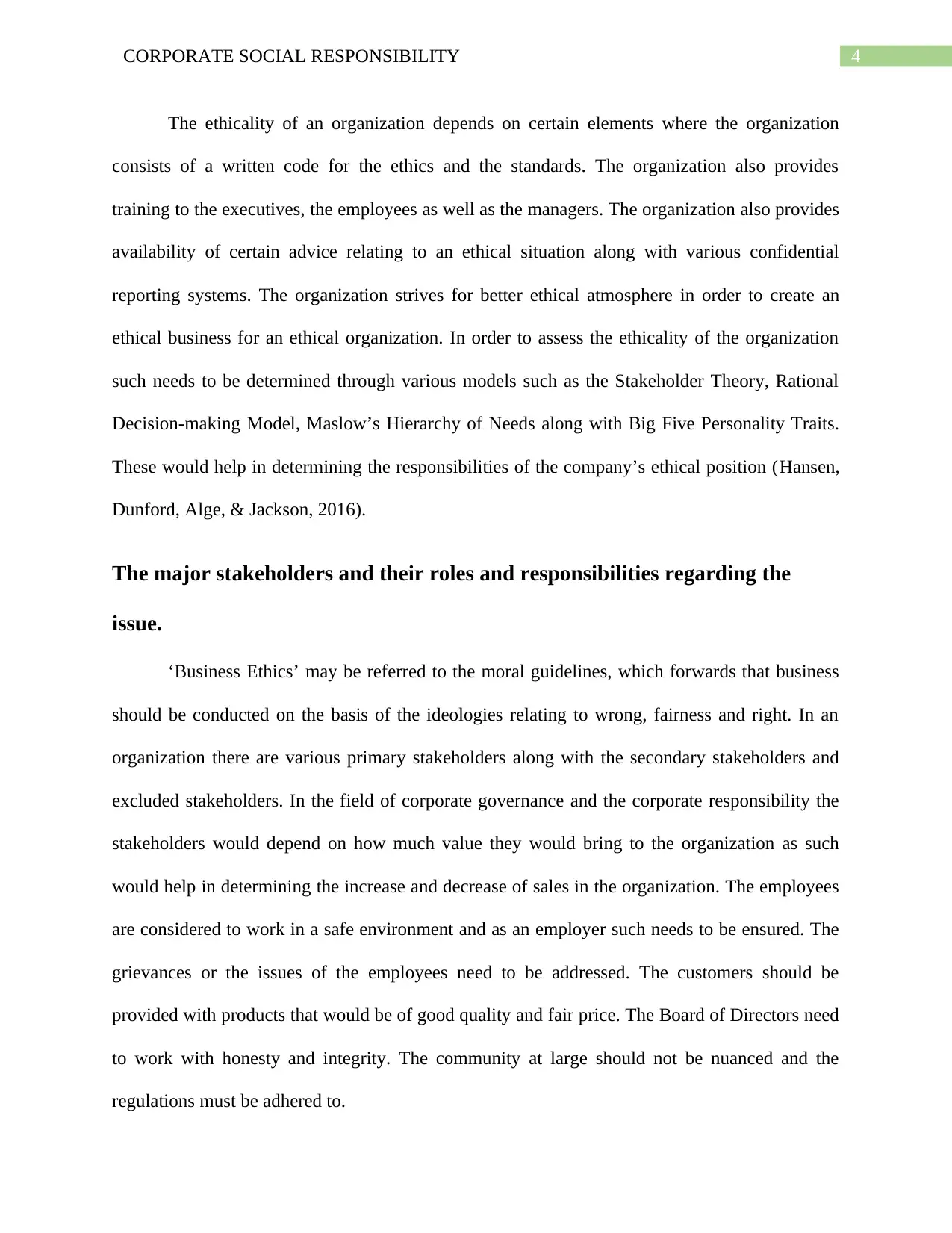
4CORPORATE SOCIAL RESPONSIBILITY
The ethicality of an organization depends on certain elements where the organization
consists of a written code for the ethics and the standards. The organization also provides
training to the executives, the employees as well as the managers. The organization also provides
availability of certain advice relating to an ethical situation along with various confidential
reporting systems. The organization strives for better ethical atmosphere in order to create an
ethical business for an ethical organization. In order to assess the ethicality of the organization
such needs to be determined through various models such as the Stakeholder Theory, Rational
Decision-making Model, Maslow’s Hierarchy of Needs along with Big Five Personality Traits.
These would help in determining the responsibilities of the company’s ethical position (Hansen,
Dunford, Alge, & Jackson, 2016).
The major stakeholders and their roles and responsibilities regarding the
issue.
‘Business Ethics’ may be referred to the moral guidelines, which forwards that business
should be conducted on the basis of the ideologies relating to wrong, fairness and right. In an
organization there are various primary stakeholders along with the secondary stakeholders and
excluded stakeholders. In the field of corporate governance and the corporate responsibility the
stakeholders would depend on how much value they would bring to the organization as such
would help in determining the increase and decrease of sales in the organization. The employees
are considered to work in a safe environment and as an employer such needs to be ensured. The
grievances or the issues of the employees need to be addressed. The customers should be
provided with products that would be of good quality and fair price. The Board of Directors need
to work with honesty and integrity. The community at large should not be nuanced and the
regulations must be adhered to.
The ethicality of an organization depends on certain elements where the organization
consists of a written code for the ethics and the standards. The organization also provides
training to the executives, the employees as well as the managers. The organization also provides
availability of certain advice relating to an ethical situation along with various confidential
reporting systems. The organization strives for better ethical atmosphere in order to create an
ethical business for an ethical organization. In order to assess the ethicality of the organization
such needs to be determined through various models such as the Stakeholder Theory, Rational
Decision-making Model, Maslow’s Hierarchy of Needs along with Big Five Personality Traits.
These would help in determining the responsibilities of the company’s ethical position (Hansen,
Dunford, Alge, & Jackson, 2016).
The major stakeholders and their roles and responsibilities regarding the
issue.
‘Business Ethics’ may be referred to the moral guidelines, which forwards that business
should be conducted on the basis of the ideologies relating to wrong, fairness and right. In an
organization there are various primary stakeholders along with the secondary stakeholders and
excluded stakeholders. In the field of corporate governance and the corporate responsibility the
stakeholders would depend on how much value they would bring to the organization as such
would help in determining the increase and decrease of sales in the organization. The employees
are considered to work in a safe environment and as an employer such needs to be ensured. The
grievances or the issues of the employees need to be addressed. The customers should be
provided with products that would be of good quality and fair price. The Board of Directors need
to work with honesty and integrity. The community at large should not be nuanced and the
regulations must be adhered to.
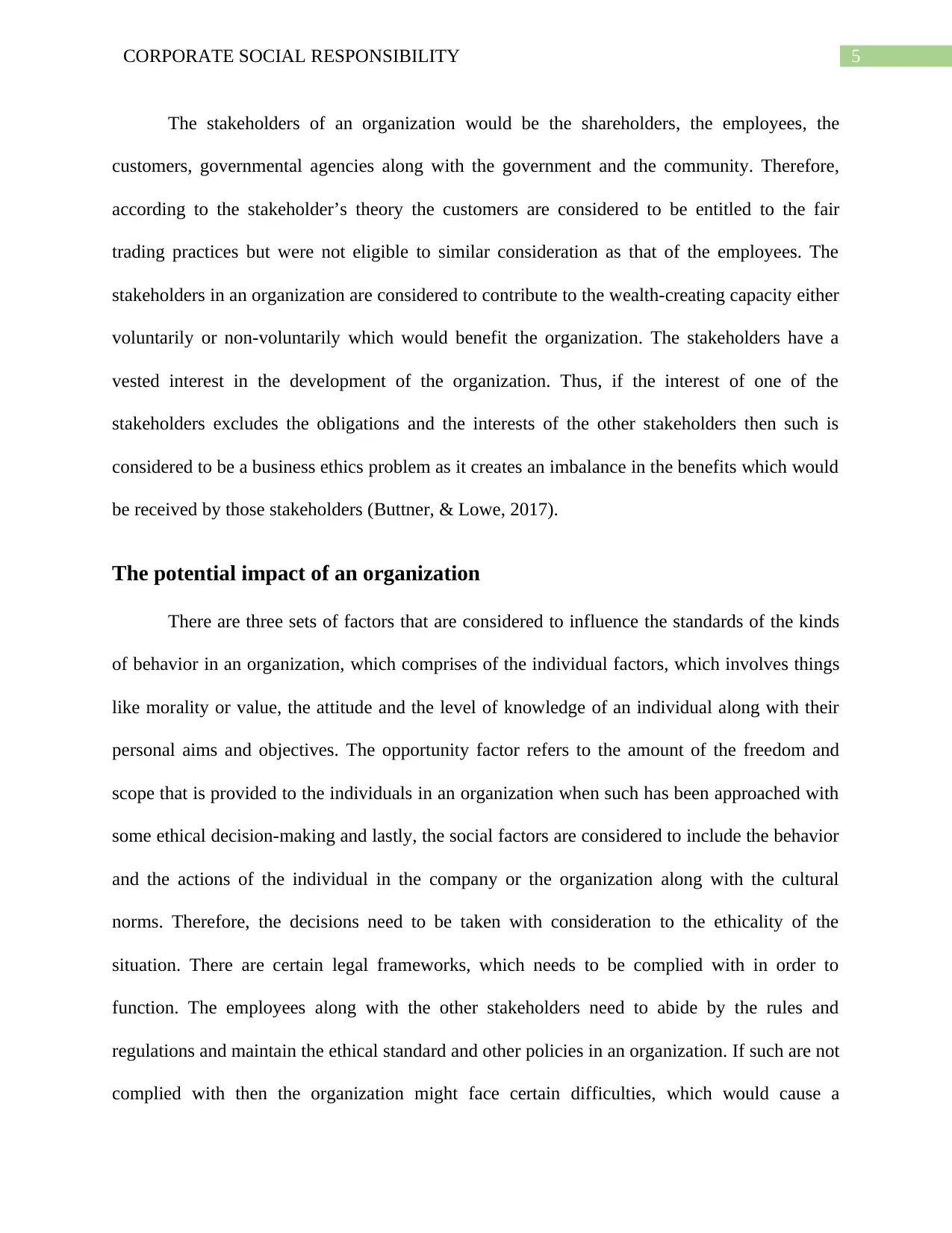
5CORPORATE SOCIAL RESPONSIBILITY
The stakeholders of an organization would be the shareholders, the employees, the
customers, governmental agencies along with the government and the community. Therefore,
according to the stakeholder’s theory the customers are considered to be entitled to the fair
trading practices but were not eligible to similar consideration as that of the employees. The
stakeholders in an organization are considered to contribute to the wealth-creating capacity either
voluntarily or non-voluntarily which would benefit the organization. The stakeholders have a
vested interest in the development of the organization. Thus, if the interest of one of the
stakeholders excludes the obligations and the interests of the other stakeholders then such is
considered to be a business ethics problem as it creates an imbalance in the benefits which would
be received by those stakeholders (Buttner, & Lowe, 2017).
The potential impact of an organization
There are three sets of factors that are considered to influence the standards of the kinds
of behavior in an organization, which comprises of the individual factors, which involves things
like morality or value, the attitude and the level of knowledge of an individual along with their
personal aims and objectives. The opportunity factor refers to the amount of the freedom and
scope that is provided to the individuals in an organization when such has been approached with
some ethical decision-making and lastly, the social factors are considered to include the behavior
and the actions of the individual in the company or the organization along with the cultural
norms. Therefore, the decisions need to be taken with consideration to the ethicality of the
situation. There are certain legal frameworks, which needs to be complied with in order to
function. The employees along with the other stakeholders need to abide by the rules and
regulations and maintain the ethical standard and other policies in an organization. If such are not
complied with then the organization might face certain difficulties, which would cause a
The stakeholders of an organization would be the shareholders, the employees, the
customers, governmental agencies along with the government and the community. Therefore,
according to the stakeholder’s theory the customers are considered to be entitled to the fair
trading practices but were not eligible to similar consideration as that of the employees. The
stakeholders in an organization are considered to contribute to the wealth-creating capacity either
voluntarily or non-voluntarily which would benefit the organization. The stakeholders have a
vested interest in the development of the organization. Thus, if the interest of one of the
stakeholders excludes the obligations and the interests of the other stakeholders then such is
considered to be a business ethics problem as it creates an imbalance in the benefits which would
be received by those stakeholders (Buttner, & Lowe, 2017).
The potential impact of an organization
There are three sets of factors that are considered to influence the standards of the kinds
of behavior in an organization, which comprises of the individual factors, which involves things
like morality or value, the attitude and the level of knowledge of an individual along with their
personal aims and objectives. The opportunity factor refers to the amount of the freedom and
scope that is provided to the individuals in an organization when such has been approached with
some ethical decision-making and lastly, the social factors are considered to include the behavior
and the actions of the individual in the company or the organization along with the cultural
norms. Therefore, the decisions need to be taken with consideration to the ethicality of the
situation. There are certain legal frameworks, which needs to be complied with in order to
function. The employees along with the other stakeholders need to abide by the rules and
regulations and maintain the ethical standard and other policies in an organization. If such are not
complied with then the organization might face certain difficulties, which would cause a
⊘ This is a preview!⊘
Do you want full access?
Subscribe today to unlock all pages.

Trusted by 1+ million students worldwide
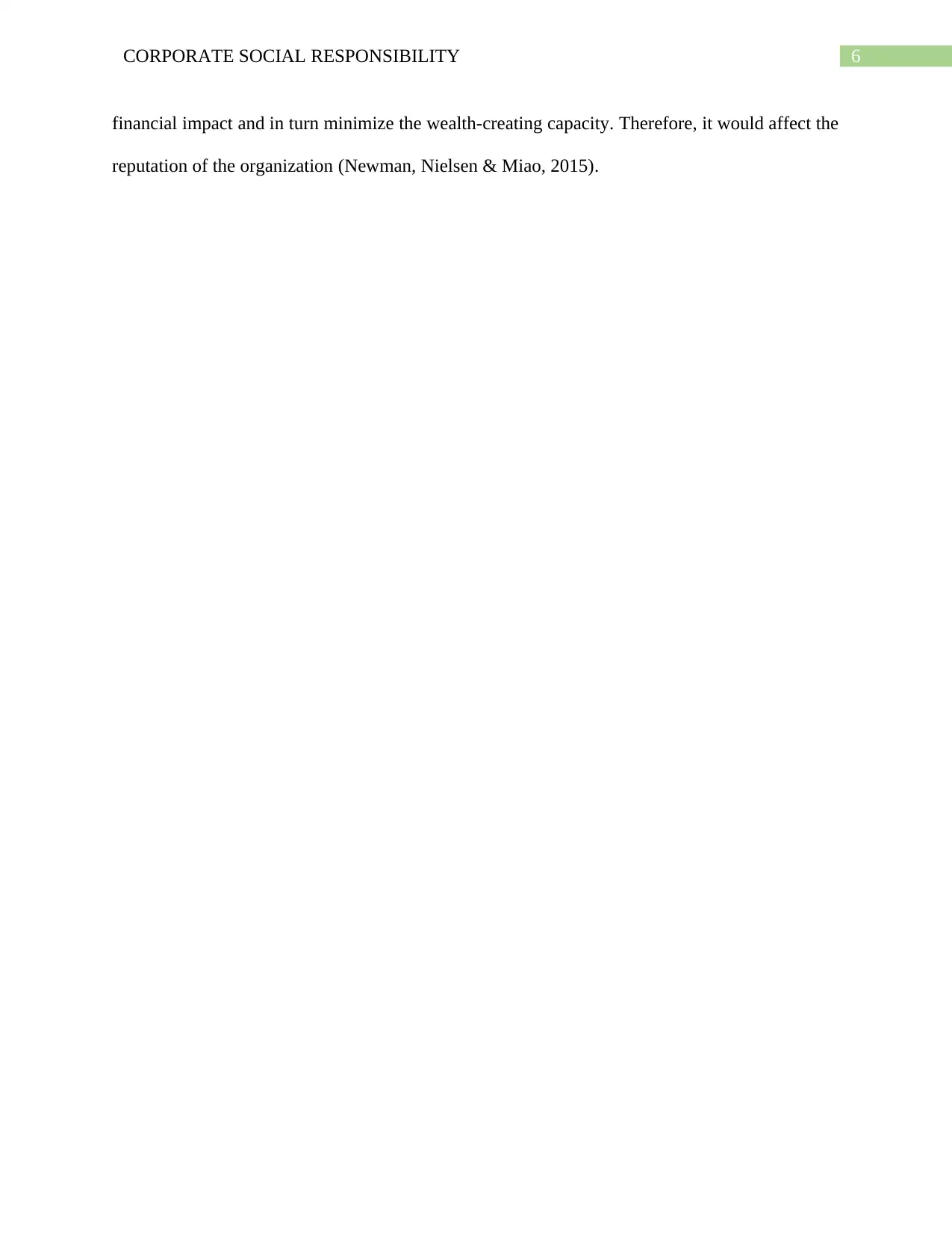
6CORPORATE SOCIAL RESPONSIBILITY
financial impact and in turn minimize the wealth-creating capacity. Therefore, it would affect the
reputation of the organization (Newman, Nielsen & Miao, 2015).
financial impact and in turn minimize the wealth-creating capacity. Therefore, it would affect the
reputation of the organization (Newman, Nielsen & Miao, 2015).
Paraphrase This Document
Need a fresh take? Get an instant paraphrase of this document with our AI Paraphraser
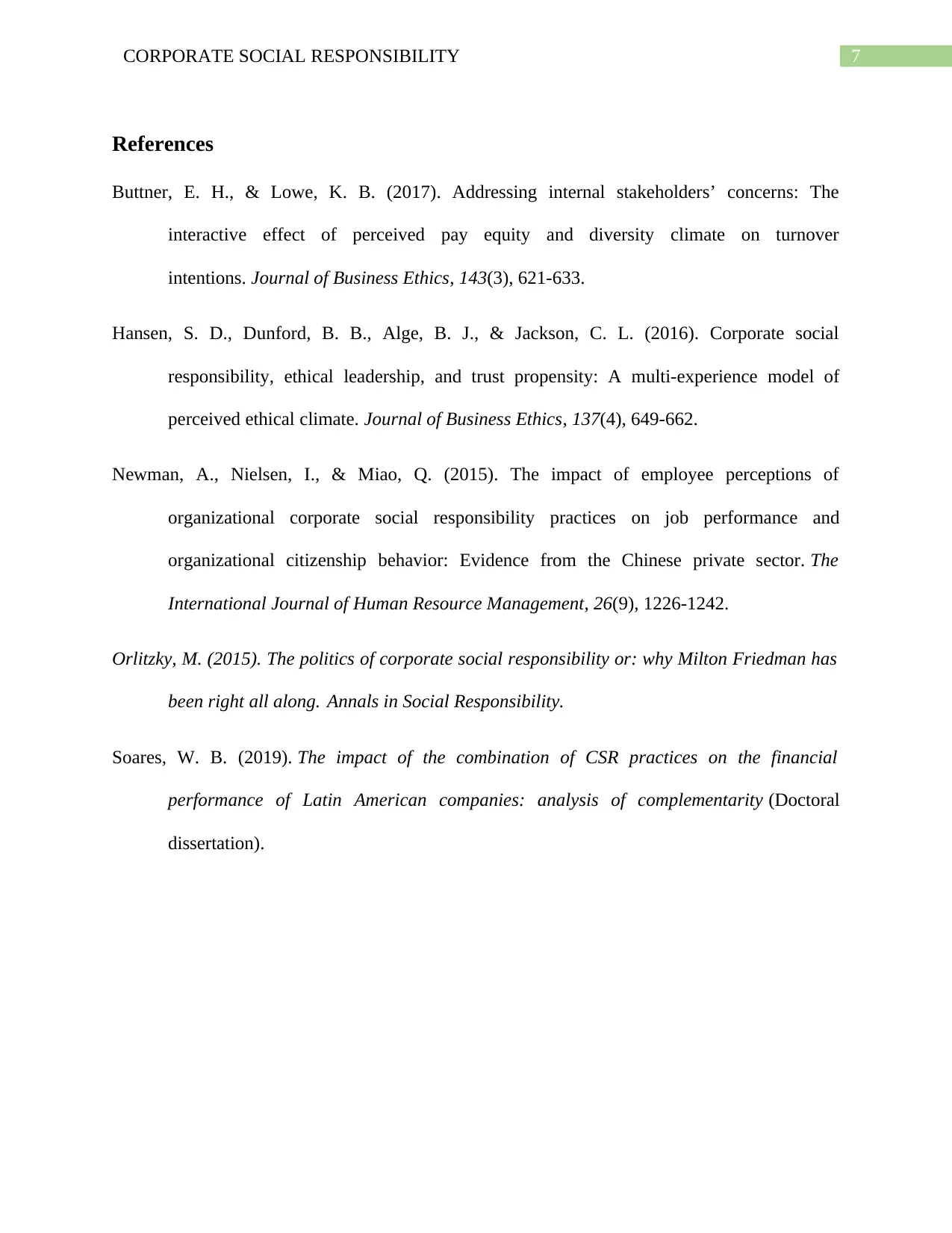
7CORPORATE SOCIAL RESPONSIBILITY
References
Buttner, E. H., & Lowe, K. B. (2017). Addressing internal stakeholders’ concerns: The
interactive effect of perceived pay equity and diversity climate on turnover
intentions. Journal of Business Ethics, 143(3), 621-633.
Hansen, S. D., Dunford, B. B., Alge, B. J., & Jackson, C. L. (2016). Corporate social
responsibility, ethical leadership, and trust propensity: A multi-experience model of
perceived ethical climate. Journal of Business Ethics, 137(4), 649-662.
Newman, A., Nielsen, I., & Miao, Q. (2015). The impact of employee perceptions of
organizational corporate social responsibility practices on job performance and
organizational citizenship behavior: Evidence from the Chinese private sector. The
International Journal of Human Resource Management, 26(9), 1226-1242.
Orlitzky, M. (2015). The politics of corporate social responsibility or: why Milton Friedman has
been right all along. Annals in Social Responsibility.
Soares, W. B. (2019). The impact of the combination of CSR practices on the financial
performance of Latin American companies: analysis of complementarity (Doctoral
dissertation).
References
Buttner, E. H., & Lowe, K. B. (2017). Addressing internal stakeholders’ concerns: The
interactive effect of perceived pay equity and diversity climate on turnover
intentions. Journal of Business Ethics, 143(3), 621-633.
Hansen, S. D., Dunford, B. B., Alge, B. J., & Jackson, C. L. (2016). Corporate social
responsibility, ethical leadership, and trust propensity: A multi-experience model of
perceived ethical climate. Journal of Business Ethics, 137(4), 649-662.
Newman, A., Nielsen, I., & Miao, Q. (2015). The impact of employee perceptions of
organizational corporate social responsibility practices on job performance and
organizational citizenship behavior: Evidence from the Chinese private sector. The
International Journal of Human Resource Management, 26(9), 1226-1242.
Orlitzky, M. (2015). The politics of corporate social responsibility or: why Milton Friedman has
been right all along. Annals in Social Responsibility.
Soares, W. B. (2019). The impact of the combination of CSR practices on the financial
performance of Latin American companies: analysis of complementarity (Doctoral
dissertation).
1 out of 8
Related Documents
Your All-in-One AI-Powered Toolkit for Academic Success.
+13062052269
info@desklib.com
Available 24*7 on WhatsApp / Email
![[object Object]](/_next/static/media/star-bottom.7253800d.svg)
Unlock your academic potential
Copyright © 2020–2026 A2Z Services. All Rights Reserved. Developed and managed by ZUCOL.





